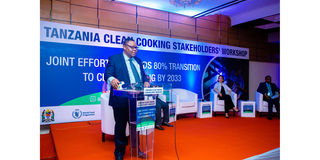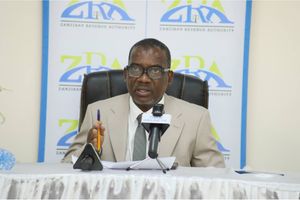Prime
Government and stakeholders fine-tune clean cooking fund structure

Permanent Secretary in the Ministry of Energy, Mr Felchesmi Mramba speaks during a two-day clean cooking workshop in Dodoma yesterday. Looking on are World Food Programme (WFP) country director and representative, Sarah Gordon-Gibson (second right) and the United Nations Capital Development Fund (UNCDF) senior finance specialist for CookFund programme, Imanuel Muro (right). PHOTO | COURTESY
What you need to know:
- The establishment of the Tanzania Clean Cooking Fund is a way of fulling President Samia Suluhu Hassan’s instructions to facilitate a swift transition to clean cooking by 2033
Dodoma. The government, in collaboration with key stakeholders, is drafting the structure of the planned clean cooking fund, a 10-year vision, and its implementation strategy for the transition to clean cooking.
The creation of the Tanzania Clean Cooking Fund is part of the implementation of the directives issued by President Samia Suluhu Hassan during the National Clean Cooking Conference held in Dar es Salaam last November.
The Permanent Secretary in the Ministry of Energy, Mr Felchesmi Mramba, told a two-day national clean cooking workshop yesterday that already the President’s directives were being implemented.
“The Ministry of Energy is leading all the preparations for the structure of the Tanzania Clean Cooking Fund and a draft of a 10-year national vision and implementation strategy for the transition to clean cooking,” he said.
During the November 2022 conference, President Hassan asked the Ministry and other relevant stakeholders to develop a comprehensive roadmap that will support the transition of 80 percent of the population to clean cooking by 2033.
Mr Mramba said yesterday that already the government had formed the National Clean Cooking Group, coordinated by the Prime Minister’s Office.
Yesterday’s event was co-hosted by the World Food Programme (WFP) and the United Nations Capital Development Fund (UNCDF) through the EU-funded CookFund Programme. Other institutions that collaborated in organizing the event include the Ministry of Energy, the Tanzania Renewable Energy Association (TAREA), the Tanzania Association of Clean Cooking Stakeholders (TACCS), and the Office of the Vice President, Division of Environment.
The event brought together clean cooking technology SMEs, diplomats, research institutions, community-based organisations, UN organisations, financial institutions, local and international organisations, government institutions, and other key players in the energy sector.
The workshop, among other things, sought to bring together the main stakeholders from the government, the private sector, and civil society to explore potential cooking technologies to support the national agenda.
Speaking at the event, a representative from the UNCDF in Tanzania, Mr Imanuel Muro, said that the organisation is working closely with the government to implement the €17 million CookFund programme.
“The CookFund programme works with private sector players to accelerate delivery of clean cooking solutions by addressing SMEs undercapitalisation and end-user affordability challenges,” he said.
On the other hand, the World Food Programme (WFP) country director and representative, Sarah Gordon-Gibson said this year WFP plans to support nearly half a million vulnerable Tanzanians, as well as Burundian and Congolese refugees, through a set of activities.
“The majority of the people we serve depend on firewood and charcoal for cooking,” Gordon-Gibson says. According to her, access to clean cooking fuel and technologies has a major impact on health, gender, economic, environmental, and climate aspects. “National policies should be backed by public and private investments,” she said.



